Business
Andrew fixed palace visit for firm with £1.4m deal with ex-wife
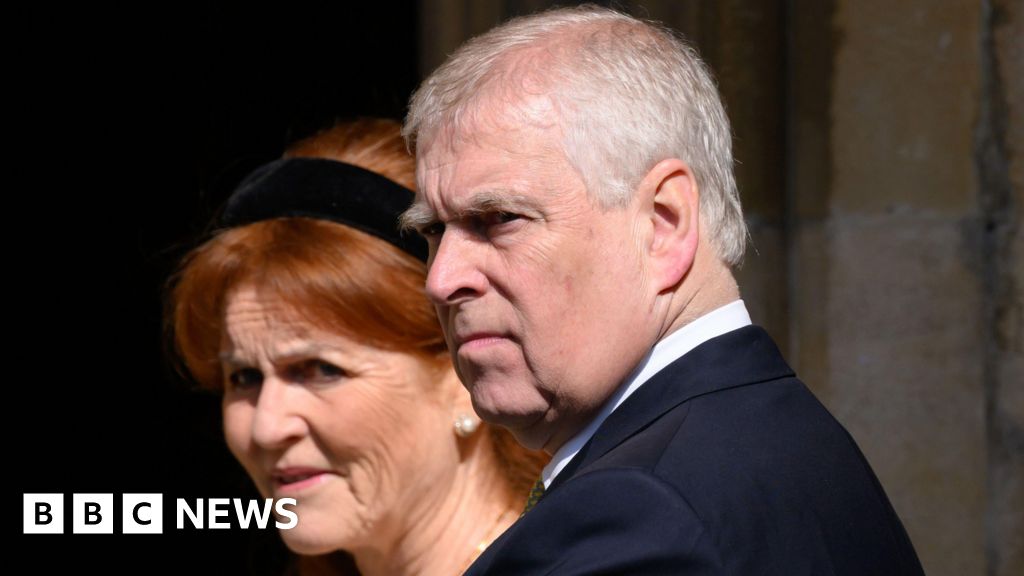
Billy Kenber,politics investigations correspondent and
Phil Kemp,political reporter
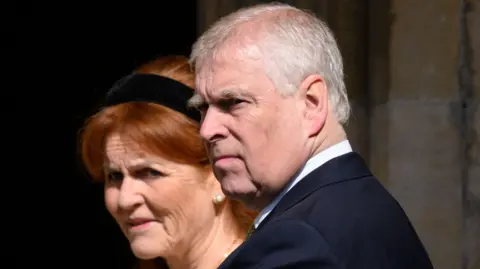 Getty Images
Getty ImagesAndrew Mountbatten Windsor arranged a private tour of Buckingham Palace while the late Queen was in residence, for businessmen from a cryptocurrency mining firm which agreed to pay his ex-wife up to £1.4m, the BBC can reveal.
Jay Bloom and his colleague Michael Evers were driven through the palace gates in the former prince’s own car after being collected from their five-star Knightsbridge hotel for the visit in June 2019.
Their company, Pegasus Group Holdings, which Mr Bloom co-founded, employed Sarah Ferguson as a “brand ambassador” for a crypto-mining scheme which would lose investors millions when it failed less than a year later.
Mr Bloom, an entrepreneur who had previously set up a failed Mafia-themed museum in Las Vegas, and Mr Evers, a former actor, were met by a greeter and escorted inside the palace.
Mr Evers told the BBC they then met the Queen, although Mr Bloom disputed this.
Both Mr Evers and Mr Bloom were invited by the then-prince to his Pitch@Palace event – a Dragons’ Den-style business pitching competition – at nearby St James’s Palace later that day, and they dined that evening with Andrew, Ms Ferguson and their daughter Princess Beatrice.
Ms Ferguson was working with Pegasus Group Holdings at the time of the palace visit, while she was Duchess of York, to promote plans to use thousands of solar power generators to mine Bitcoin at a remote site in the Arizona desert.
But the project ultimately failed with only 615 of the planned 16,000 generators acquired and just $33,779 (about £25,000) in cryptocurrency mined.
In April 2021, some investors took legal action, claiming millions of dollars of investor funds were unaccounted for. A tribunal awarded the investors $4.1m, but Mr Bloom is seeking permission to appeal.
The revelations add to growing questions about how Andrew and his former wife have funded their lifestyle, as well as long-standing concerns about their business connections and that the then-prince may have used his royal titles and connections for private gain.
On Thursday evening, Buckingham Palace announced that it was starting the formal process of stripping Andrew of his royal titles and that he would be losing his Windsor mansion, following intense criticism of his links with the billionaire paedophile Jeffrey Epstein.
Andrew and Ms Ferguson did not respond to a detailed list of questions about their involvement with Mr Bloom and the crypto-mining venture.
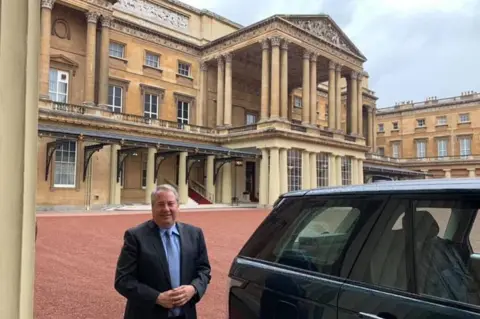 Facebook
FacebookSarah Ferguson was paid more than £200,000 for her work for the company and a leaked contract reveals she was in line for a separate bonus worth £1.2m.
She also received a stake in the business, which proposed using solar generators to reduce the cost of the energy-intensive computer calculations needed to generate or “mine” the digital currency Bitcoin.
Her contract stipulated that she required first-class travel, five-star hotels and the services of a professional hairdresser and make-up artist for the maximum of four “networking events” she would attend on the company’s behalf.
It said she did not “hold herself out as an expert on the solar industry” and therefore accepted no responsibility for “industry-related information or commercial assessments” used as the basis for her statements promoting the company.
A royal friendship
Sarah Ferguson first met the Las Vegas businessman Jay Bloom in May 2018 when she was at a convention in the city to promote one of her children’s books.
The pair struck up a friendship and business relationship.
Pegasus documents would subsequently describe her role as to “engage with the company’s clients, investors and strategic relationships” as well as involvement with the company’s planned “philanthropic activities”.
For Mr Bloom, it was an introduction to royal circles which would lead to visits to Buckingham Palace and St James’s Palace, a tour of Ms Ferguson and Andrew’s home, the Royal Lodge in Windsor, and dinners with her and her family in at least four different countries.
Eight years before the duchess signed up to be a brand ambassador for Pegasus, Mr Bloom had hit the Las Vegas headlines, accused of missing payments and deceiving investors in connection with a “mob experience” exhibition in the city. Mr Bloom denied wrongdoing, fought investors’ lawsuits and vowed to repay them.
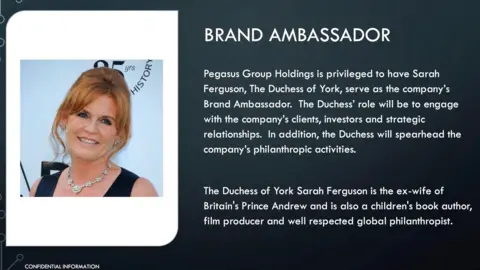
He now had a new company, Pegasus, and ambitions to build a hotel and casino in Greece.
It was there in July 2018, while considering investing in the company, that Michael Evers, a former actor and reality TV star who had made money from cryptocurrency investments, first met Ms Ferguson.
The hotel and casino did not get built, but Mr Bloom had soon pivoted Pegasus to a new idea, one that was inspired by seeing a mobile solar power generator in use at the Las Vegas motor speedway in early 2019, according to filings in the later legal action brought by investors.
Mr Bloom and his co-founders hit upon a plan to use vast banks of these units to power a crypto-mining operation. The endeavour, the company estimated, would generate millions of dollars a month.
In March 2019, Ms Ferguson had dinner with Mr Bloom in Los Angeles. They had lunch at the Beverly Hills Hotel a few days later as she helped him try to close a deal for Pegasus. One of her daughters stopped by during the meal.
Mr Evers was now working for Pegasus as well as being an investor. He said he and Mr Bloom were regularly in London over the following months as they explored taking Pegasus public on the AIM market – part of the London Stock Exchange for growing companies.
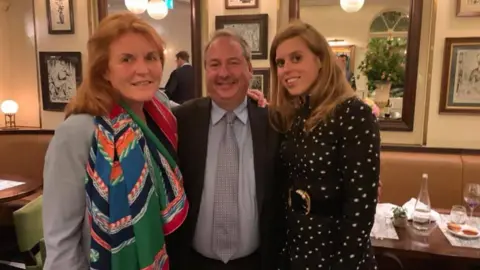 Facebook
FacebookHe said he got to know Ms Ferguson and her family and “through all that, I met Prince Andrew [and] Princess Beatrice and a lot of their family” who he described as “really great people, really friendly”.
“We were there once a month for a week to two weeks at a time and every time the relationships just kind of grew stronger and stronger and they started offering tours of different places, I guess like behind the scenes or I don’t know what you’d call it,” Mr Evers said. “And just wanting to introduce us to more and more people.”
As well as a tour of the Royal Lodge, Andrew and his ex-wife arranged for the pair to visit Buckingham Palace on a day in June 2019 when it was closed to the public.
They were picked up from their Knightsbridge hotel by an official driver in a dark blue Range Rover used by Andrew and driven through the palace gates in the early afternoon.
Once inside they were taken through to the inner courtyard, where a female greeter was waiting to meet them. A video taken by the men from inside the car captured their arrival.
A former Royal Household employee, who reviewed the footage, told BBC News that it was clear that palace security staff on the gate were expecting the vehicle.
“The ramp was dropped before they came out to speak to the driver,” they said. “That was the reception we’d expect if we were carrying a member of the Royal Family.”
What happened once they went inside is disputed by the two men.
Mr Evers said they had been told in advance that there would be an opportunity to meet the Queen. But once there, he said staff told him he was not allowed to take photos.
“They didn’t want anyone knowing that we were meeting Elizabeth. And it was very, very brief, she was not doing super well, so it was more just like a hello and in passing. No touching or anything,” he said.
He said it wasn’t a formal meeting, “it was just like a quick, ‘hello, goodbye'”.
The Queen was in residence that day, with her published schedule including her regular weekly audience with the prime minister. The Palace was unable to confirm or deny whether the introduction with the two men took place.
Responding to questions by email, Mr Bloom initially said he had decided just to visit the palace as a tourist. He subsequently said the only person he met at the palace was a “staffer”.
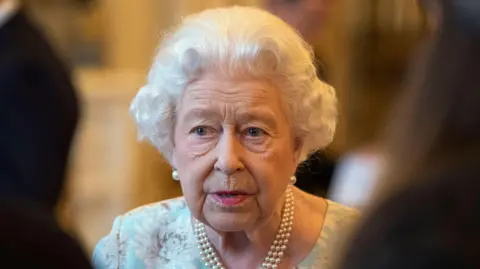 Getty Images
Getty ImagesWhen challenged and presented with evidence from his own social media, which included footage of him being driven into the palace, and comments about spending time with Andrew, and there being “pictures I can post, the pictures I can’t, and then the stuff I couldn’t take pictures of… lol”, Mr Bloom said he had misremembered.
He then admitted that he “was in fact shown to Andrews [sic] office and did thank him for the car and for him and Sarah arranging the tour”.
He denied ever having met or been in the same room as the late Queen.
Mr Bloom made a second visit to Buckingham Palace in July 2019, photos show. On social media he made an apparently joking reference to “meeting HRH”.
Helicopters and guns in the desert
Two months later, Ms Ferguson was one of two celebrity guests – alongside the motivational speaker Tony Robbins, who says he has coached figures such as Serena Williams and Hugh Jackman – at a “ground breaking” for Pegasus’s energy project launch in the Arizona desert.
They were flown in, with Mr Bloom, Mr Evers and others, in two black-and-gold helicopters and posed with gold-coloured spades and construction hats at the remote site of what Pegasus promised would become a multi-billion-dollar off-grid data centre.
With armed guards with AR-15 rifles and pistols standing nearby, Mr Bloom introduced Ms Ferguson at a press conference as a “personal friend”.
In the short speech that followed, Ms Ferguson praised the company, saying she was “so proud to be here” and touted the potential philanthropic uses of the technology in Africa.
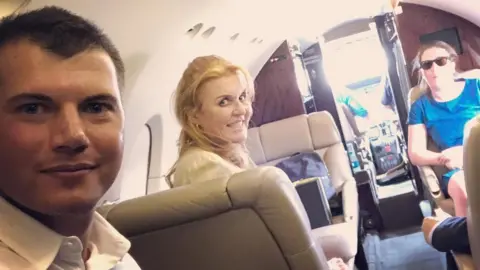 Instagram
InstagramThat October, a month before Andrew’s fateful BBC Newsnight interview where he disastrously attempted to explain his connections to Mr Epstein, Ms Ferguson signed a contract agreeing to provide specific services for Pegasus.
For reasons that remain unexplained, the contract itself was with Alphabet Capital, a British company whose owner, Adrian Gleave, ran a number of caravan and holiday parks.
A High Court ruling in London in 2024 has previously revealed that Ms Ferguson received more than £200,000 for her work for Pegasus from Alphabet Capital.
Andrew has also received money from Alphabet, including £60,500 traced to Mr Gleave and his businesses, according to court documents previously reported by the BBC.
Neither Andrew nor Mr Gleave have explained why this money was paid.
Mr Bloom said he has never heard of Alphabet or Mr Gleave and there was no connection with Pegasus.
Lawsuits and recriminations
A year after investing millions of dollars in the crypto solar scheme, some of its main investors became concerned about progress and began legal proceedings.
In 2023, judges from the Commercial Arbitration Tribunal in the US found in the investors’ favour awarding them millions of dollars.
Jay Bloom has since mounted a number of legal challenges over the award in the Nevada courts.
Mr Bloom told BBC News that Pegasus emphatically disputed “any allegations of misconduct” and said they were “addressing the clearly flawed arbitral findings through established legal processes”.
Andrew and Ms Ferguson did not respond to the BBC’s questions, including whether Ms Ferguson planned to repay money received for her Pegasus work to the company’s investors.
Mr Evers said he regretted being involved with Pegasus. He said Mr Bloom was “working very, very hard to get all the investors paid back” but that he was frustrated to still be owed money himself several years later.
- If you have any information on stories you would like to share with the BBC Politics Investigations team, please get in touch at politicsinvestigations@bbc.co.uk
Business
Disney supercharged its parks. The booming division still has room to run

People walk in front of Cinderella’s Castle at the Magic Kingdom Park at Walt Disney World on May 31, 2024, in Orlando, Florida.
Gary Hershorn | Corbis News | Getty Images
All is well in the Magic Kingdom — and all of Disney’s other theme parks, too.
The company’s experiences division, which includes its parks, cruise ships, hotels and consumer products, posted record revenue for the fiscal first quarter, topping $10 billion for the first time in Disney’s more than 100-year history. It also reported operating income of $3.3 billion, a 6% bump from the same period a year ago.
Growth in this segment has supercharged in the wake of the Covid pandemic. It often accounts for the lion’s share of the company’s profits. For the period ended Dec. 27, experiences represented 38% of Disney’s total revenue, yet generated a whopping 71% of its operating income.
Company executives expect those good times to continue, forecasting high-single-digit growth in operating income for the segment for fiscal 2026.
“When you look at the footprint of the business today, it’s never been more broad or more diverse,” Bob Iger, CEO of Disney, said during Monday’s earnings call. “And the projects that we have underway are going to make it even more so.”
The strong parks performance comes against the backdrop of a CEO succession competition that could see Chairman of Disney Experiences Josh D’Amaro step in for Iger. The Disney board is meeting this week and is expected to vote on its next CEO, according to people familiar with the matter who spoke on the condition of anonymity about internal matters.
Industry insiders and Disney sources expect D’Amaro to be appointed Iger’s successor, though the decision ultimately lies with the Disney board and won’t be final until directors vote.
“The board has not yet selected the next CEO of The Walt Disney Company and once that decision is made, we will announce it,” a Disney spokesperson said in a statement, declining to comment on the timing of the next board meeting.
Parks expansion
Much of the experiences division’s success comes from major investments to expand the footprint of Disney theme parks, refurbish existing rides and themed areas of its parks, add cruise ships to its fleet and grow its digital gaming presence. This new evolution of the segment is being fueled by Disney’s library of franchises and iconic intellectual property.
Disney has long pulled from its portfolio of content. Disneyland opened its doors more than 70 years ago with rides based on “Alice in Wonderland,” “The Adventures of Ichabod and Mr. Toad,” “Peter Pan” and “Snow White.”
While those classic attractions remain, the company’s more recent developments have been fueled by Iger’s strategic acquisitions of four major film studios — Pixar in 2006, Marvel in 2009, Lucasfilm in 2012 and 20th Century Fox in 2019. This brought coveted franchises under the House of Mouse roof, including Star Wars, Toy Story, the Avengers and Avatar.
“As we added IP to our stable … we gained access to intellectual property that had real value in terms of parks and resorts, and enabled us to lean into more capital spending because of the confidence level we had in improving returns,” Iger said.
Having the film and television rights to these properties allows the company more control over production and how that translates into rides, experiences and merchandise.
And that work continues as part of a 10-year, $60 billion investment effort that launched in 2023.
“We have expansion projects underway at every one of our theme parks,” Iger said.
He touted the upcoming opening of the World of Frozen in Disneyland Paris and the launch of a new cruise ship, the Disney Adventure, which will make berth in Asia.
On the horizon is also a new villains land coming to Magic Kingdom as well of the reshaping of “Rivers of America,” “Tom Sawyer Island” and the “Liberty Square Riverboat” into an area called “Piston Peak” — a second Cars-themed land modeled after America’s natural parks. At Hollywood Studios there will be a new “Monsters Inc.” land while the Muppets will take over the Rock ‘n’ Roller Coaster attraction. Animal Kingdom will host an “Encanto” ride and a new Indiana Jones ride.
At Disneyland, Avengers Campus, the Marvel-themed area, will get two new attractions, guests will get a glimpse at the Land of the Dead from “Coco” and Disney will build a new Avatar area inspired by the scenery in “Avatar: Fire and Ash.”
Internationally, Disney has struck a deal to bring a new park and resort to Yas Island in the United Arab Emirates.
International headwinds
The company’s commitment to bringing beloved IP into its parks is paying off, according to Iger, particularly outside the U.S.
“The percentage of people that go to Shanghai Disneyland just to go to Zootopia Land is very, very high,” he said Monday.
Revenue from international theme parks and experiences grew 7% during the fiscal first quarter, to $1.75 billion.
Of course, the company is still facing headwinds from the decline of international visitors to its domestic parks.
It’s a trend that many theme park destinations in America are contending with, as overall tourism to the United States fell 6% in 2025. Industry analysts point to higher travel costs and fees, ongoing trade frictions and geopolitical unease for the drop in demand for travel stateside.
Despite this, domestic theme park and experiences revenue grew 7% during the quarter, to $6.91 billion.
New offerings at Disney’s international parks, the launch of a cruise ship that services Asia and the new Abu Dhabi park are all ways that Disney can tap into that foreign market and engage with consumers that are not making the trek to the company’s domestic destinations.
— CNBC’s Julia Boorstin and Alex Sherman contributed to this report.
Business
How ‘Dry January’ turned into ‘Damp Monday’ at this popular supermarket

The annual tradition of “Dry January” turned into “Damp Monday” at one supermarket, with shoppers returning to alcohol consumption in the middle of the month.
Waitrose said that the month was “not so dry after all,” identifying January 12 as “Damp Monday” after sales of wines, beers, and spirits surged by 11 per cent compared to the week before.
The grocer noted a “significant softening” of the Dry January trend over the past five years, suggesting a more balanced “Damp January” approach is now prevalent.
While alcohol sales in January 2022 were 42 per cent lower than other months, this year saw a reduced drop of just 25 per cent.
Notably, Argentinian and Chilean wine sales experienced a considerable boost last month, rising by 25 per cent and 27 per cent respectively compared to the previous year.
Compared to this time last year, searches on Waitrose.com for “Argentinian wine”, “red wine” and “Chilean wine” were up 300%, 63% and 18% respectively.
Pierpaolo Petrassi, head of beers, wines and spirits at Waitrose, said: “Damp is the new dry, as we’re seeing customers move away from the ‘all-or-nothing’ mentality and instead look towards more mindful, ‘damp’ moderation rather than quit entirely.
“This shift sees the likes of a luxury Argentinian Cabernet sitting comfortably alongside premium non-alcoholic spirits as sophisticated sips, proving that the modern palate values flavour profiles and social connection over the buzz alone.
“No doubt the no and low trend skyrocketed in 2022 as the result of the ‘pandemic reset’ transitioning out of the final lockdowns, as well as the ‘sober curious’ movement going mainstream on social media.
“Now, 2026 is the ‘lifestyle’ year, with customers finding balance as part of a more tempered, year-round approach to drinking.”
Data reported by The Spirits Business trade publication from early this year suggested that while 58% of the UK public aimed to cut back, a significant portion – roughly 31% – had opted for a “damp January” – reducing intake rather than cutting it out entirely.
Business
Budget eases PF, ESI deduction rules for employers, allows relief for delayed deposits – The Times of India

In a move expected to bring relief to employers and reduce routine tax disallowances, the finance bill has proposed a key change to the treatment of employees’ provident fund (PF), ESI and similar contributions, allowing deductions even where there is a delay in deposit, provided the amount is deposited by the employer entity with the relevant welfare fund authorities before the due date of its Income-tax return.At present, employers can claim deduction for employees’ PF and ESI contributions only if the amounts are deposited within the strict timelines prescribed under the respective welfare laws. Even a minor delay permanently disqualifies the expense for tax purposes, a position that had been settled by the Supreme Court (SC) after years of litigationUnder the proposed amendment to Section 29 of the Income-tax Act, 2025, the definition of “due date” for claiming deduction of employees’ contributions is set to be aligned with the due date for filing the income-tax return by the employer entity.Explaining the shift, Deepak Joshi, a SC advocate said employers are currently held to a rigid standard. “The law, as interpreted by the SC, meant that if employee contributions were not deposited within the due date under the relevant welfare fund laws, no deduction was allowed — even if the payment was made before filing the income-tax return,” he said.“The proposed amendment substitutes the definition of ‘due date’ to mean the due date of filing the income-tax return. The positive impact is that even if there is a slight delay in depositing employees’ contributions, so long as the amount is deposited before the return-filing deadline, the employer will be allowed the deduction,” Joshi added. Experts view the move as part of the government’s broader effort to soften compliance rigidities and reduce avoidable litigation.
-

 Sports6 days ago
Sports6 days agoPSL 11: Local players’ category renewals unveiled ahead of auction
-

 Entertainment6 days ago
Entertainment6 days agoClaire Danes reveals how she reacted to pregnancy at 44
-

 Tech1 week ago
Tech1 week agoICE Asks Companies About ‘Ad Tech and Big Data’ Tools It Could Use in Investigations
-

 Business6 days ago
Business6 days agoBanking services disrupted as bank employees go on nationwide strike demanding five-day work week
-

 Fashion1 week ago
Fashion1 week agoSpain’s apparel imports up 7.10% in Jan-Oct as sourcing realigns
-

 Sports6 days ago
Sports6 days agoCollege football’s top 100 games of the 2025 season
-

 Politics1 week ago
Politics1 week agoFresh protests after man shot dead in Minneapolis operation
-

 Politics6 days ago
Politics6 days agoTrump vows to ‘de-escalate’ after Minneapolis shootings





